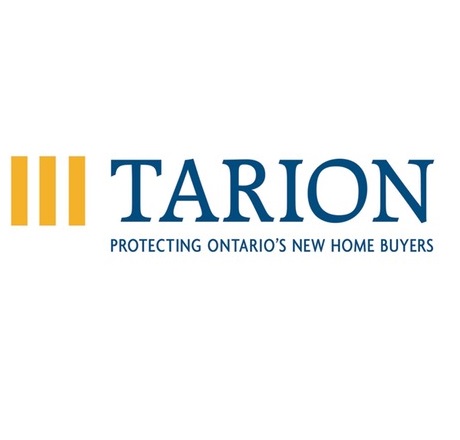I have never, not for a moment, thought that TARION “protects new home buyers.”
That might be what is written on their logo below, and that might be their official mandate.
But during the Toronto construction boom in the last decade, for both houses and condos, builders have had complete control to do whatever they want, with little consequence.
All that is about to end, and the Toronto Star is to thank…

Tell me if you’ve ever heard one of these two gross-generalizations:
1) “TARION doesn’t protect consumers, it protects developers.”
2) “TARION is run by developers.”
I have.
Many, many times! And from just about everybody in the industry – buyers, sellers, home inspectors, Realtors, and although they would never admit it openly, a few salespeople who work the floor at condo sales centres.
Those are the two most common critiques of TARION, and while both are extreme generalizations, there’s definitely some truth in there too.
Let me start from the beginning.
What is TARION? What is it’s purpose? Who controls it?
TARION was formed in 1976 after the government of Ontario instituted the “New Home Warranties Plan Act.”
TARION is funded, 100%, by builder registration, renewal, and home enrollment fees.
The primary purpose of TARION is to, as I alluded to above, “protect consumers,” specifically those who purchased new homes, by ensuring that developers and builders follow the provincial legislation laid out for them.
Right. That all sounds well and good.
But who is TARION?
Well, it’s builders.
So this is a body of builders, regulating builders, ensuring builders follow rules for builders, and when builders need to be disciplined, they are done so by, you guess it, builders.
The whole thing is an absolute farce, and always has been, in my opinion.
I’ve been saying this for a decade, as the condo construction boom in Toronto has lowered the bar, building-by-building, as every successive condo developer (save for a few “good guys”) looks for new ways to screw over the consumer.
But can you blame them?
They, themselves are in charge of their own licensing and discipline!
Perhaps I’m straying too far off topic, but I wanted my feelings on the matter to get on paper first.
TARION, since its inception over 40 years ago, has two primary objectives:
1) Administer the New Home Warranty Program.
2) Oversee licensing, registration, and discipline of developers.
Those are two massively different jobs, and while I see merit in the idea of TARION overseeing the warranty program, the idea of them self-regulating never made any sense to me.
So last week, when it was announced that the Ontario government would strip TARION of the latter half of its duties, it came as no surprise to me, but it did come way too late, in my opinion, and that of most people you’d poll on the street.
The Toronto Star broke the story first.
Here’s an excerpt:
“Province Stripping TARION of Builder-Regulator Role”
Kenyon Wallace
March 28th, 2017
The Ontario government is stripping Tarion new home warranty corporation of its responsibility to regulate the province’s homebuilders.
“Tarion’s multiple roles and responsibilities can give rise to a perception of conflict of interest, and could result in an actual conflict or conflicts of interest,” Government and Consumer Services Minister Tracy MacCharles said Tuesday. “The new home building sector is an important driver of Ontario’s economy and, quite frankly, I believe it deserves a stand-alone regulator.”
Tarion, created by the province 40 years ago, fulfils multiple roles, including rule-maker, homebuilder-regulator, warranty provider and adjudicator between buyers and builders.
An ongoing Star investigation has found Tarion was keeping secret records of poor or incomplete work in new homes. The Star found many cases where Tarion ruled problems in new homes should be fixed, but the deficiencies were not published on the corporation’s public builder database.
The government’s planned bill will draw from a report by former associate chief justice J. Douglas Cunningham, who examined Tarion and the Ontario New Home Warranties Plan Act.
While a new standalone regulator for builders is to be created, Tarion will remain responsible for administering warranty claims made by homebuyers on deficiencies in new homes and condos, the minister said.
The government will also assume responsibility for approval of warranty terms on new builds. Since Tarion’s creation in 1976, the corporation’s board of directors — half of whom are developers — has had the unique power to enact its own regulations, such as those governing warranty terms and builder performance.
For those of you that don’t know the history, The Toronto Star has been investigating, and reporting on TARION for quite some time now!
In July of 2013, the Toronto Star wrote: “Star Investigation: Home Buyers Not Getting The Full Picture From Protector TARION.”
Have a read, if you can stomach it. This is stuff I’ve been saying for years, but in the article, there’s the obligatory “name and face” that make it more real.
Or, simply read the sub-heading, which sounds like it was taken directly from my mouth:
“It appears to us to be a system designed by builders for the protection of builders.”
In July of 2016, the Toronto Star wrote: “Consumers Report ‘Lack of Faith’ In TARION’s Builder Records.”
This was after Chief Justice J. Douglas Cunningham was commissioned to examine TARION and the Ontario New Home Warranty Program, and provided an interim report, which was gobbled-up by the Toronto Star.
In October of 2016, the Toronto Star wrote: “Ontario Corporation TARION Spends Millions In Salaries, Advertising, Conferences.”
In this article, we learned that the financial statements of TARION were not available in Canada, but were available in the United States, and that, for a change (that’s sarcasm), a wing of government is spending money on itself, with no recourse.
All the articles were written by Star columnist Kenyon Wallace, who I’m pretty sure I played soccer with in the late 80’s and early 90’s in the Leaside Soccer Association. Pretty random nugget of info, but I have a memory like you wouldn’t believe…
The Toronto Star was the first to report last week that the government would be stepping in and reducing TARION’s role, and they deserve credit for the work they’ve done in the past few years.
They did give themselves some credit when they published THIS last week. And “….Toronto Star deserves credit” is a Google favourite, no matter what you search for!
So that’s the background on the matter.
And before you ask, “Why the hell were builders allowed to self-police in the first place,” let’s remember that even the police, self-police, pardon the pun.
The timing of this news below, could not be more ironic, given the discussion we’re having right now.
Check this out:
“Report Aimed At Enhanced Civilian Oversight Of Ontario Police Out This Week”
Colin Perkel, The Canadian Press
April 2nd, 2017
Just how Ontario’s police should be policed is the topic of a major report expected Thursday in which a judge with the province’s top court will reveal the results of his comprehensive review of the issue.
The 263-page report by the Independent Police Oversight Review is the product of seven months of fact-finding and information gathering across the province.
Justice Michael Tulloch, who headed the government-commissioned review of the three bodies that oversee policing in the province, makes 129 recommendations aimed at streamlining oversight and making it more transparent and accountable.
“It is a broad law-reform proposal,” senior review counsel, Danielle Robitaille, said of the report. “I hope it’s well received and the government takes it up.”
Currently, the Special Investigations Unit is the best known of the agencies. Its mandate is to investigate death, serious injuries, or sexual-assault allegations involving police and to decide whether criminal charges against an officer are warranted. However, the unit has frequently been criticized as having a penchant for secrecy, or for being stacked with former police officers whose sympathies may be skewed toward law enforcement.
I don’t want to get into a debate about the SIU, or police self-policing, today.
The point I’m making is that it’s not uncommon in many industries, although it seems like on a long-enough time horizon, it eventually comes to an end.
Consider real estate, for example.
The Real Estate Council of Ontario oversees licensing, regulation, and discipline of Realtors.
But they didn’t always!
This was before my time, but as recent as the late-1990’s, the Ministry of Commercial & Consumer Affairs was responsible for real estate oversight, and I’m guessing it just wasn’t working, since RECO was formed shortly thereafter.
So imagine for a moment, if real estate agents were in charge of licensing, regulating, policing, and disciplining real estate agents.
The public already has enough mistrust of our industry, so imagine if RECO didn’t exist?
Imagine if they weren’t tasked with reviewing complaints, and handing down discipline? It would be a proverbial sh!t-show!
Perhaps back in 1976, when development in Toronto was small, the idea of TARION being responsible for new home warranties and for licensing and disciplining builders, made sense.
But as the construction boom in Toronto has continued, the idea just became less and less feasible. And as the Toronto Star began to report back in 2012 and into 2013, it clearly wasn’t working.
There is an inherent need for a new government body to step in and take on the role of licensing, regulation, and discipline.
TARION can handle the warranties, which is the only thing they should have been doing.
And while I don’t love the idea of yet another government body being formed, I think in the long run, developers will be far more accountable.
Realtors are required to take mandatory education, courses, and updates, not only to improve their knowledge base, but to keep up to date.
Builders don’t have the same requirement, even though many of them are complete novices (just like Realtors), with little-to-no knowledge to begin with, and even though building codes change, building materials and processes evolve, and styles come and go.
Once this unnamed new government body is formed, something tells me that a similar series of courses and updates will be required of developers and builders, and who can suggest that’s a bad thing?
One of the biggest problems we have among freehold developers is their attempts to continually skirt HST, and often not provide TARION warranties.
You guys know the drill, right?
You tear down a house to build a new one, only you don’t call it “new,” but rather you call it a “substantial renovation.” Even though the only thing that exists from the house that is, supposedly, being renovated, is a brick wall or two, the developer claims is’s not a new house, and thus doesn’t provide a TARION warranty.
This is also often accompanied by the notion that the developer is the owner-occupant, hence the Rogers bill and maybe a House&Home subscription coming each month to the mailbox, all in attempts to avoid paying HST.
There are so many “new, but not new” houses in North Toronto right now where the developer apparently built for himself, and intended to move in with his family, but changed his mind after a week sleeping on a mattress on the floor in the living room. Now the house is for sale, with no warranty, and with no intention of paying HST or capital gains.
Folks, you can’t leave a pack of wild dogs alone in a room with a bone, and not expect them to eat the bone.
On a long enough time horizon, self-interest trumps good intentions.
The time for builders to self-police has come and gone, and last week’s announcement is a great thing.
How ironic that the only way for Ontario’s new home buyers to be protected, was to take away the right to protect, from those who were in charge of the protection in the first place…































Darren
at 8:42 am
In case you missed it, the recent budget added a requirement to disclose any home that is sold with your tax return. Big fines for those that fail to do so I believe. That’s going to put an end to the developers moving from house to house to renovate.. at least put a stop to them trying to avoid taxes on them.
Jack
at 6:57 pm
It’s a good first step that should have been put in place long time ago. But the owner/developer will still pay no capital gains tax if he declares the house as his principal residence.
Zar
at 9:07 pm
It’s not very profitable to build infill homes if you have to pay tax. The return would be terrible when you consider carrying costs, interest on loans and hard costs with respect to land prices skyrocketing. Ask yourself, would you risk 7 figures of upfront capital to only make 10% if you get taxed the on a 2M+ price point. More profit balance between land appreciation and value added to the property is becoming heavily unbalance. Developers move house to house because it’s all they can afford, there is a fund that just keeps getting moved from property to property just so they can work. Not an easy game like the public may be led to believe.
Ralph Cramdown
at 8:45 am
“So imagine for a moment, if real estate agents were in charge of licensing, regulating, policing, and disciplining real estate agents.”
OK, I close my eyes. I see a bunch of smiling headshots of board members who are all brokers or agents. Wait, something fuzzy in the corner. Oh, the government would probably appoint a representative as window dressing, but he probably wouldn’t be a professional civil servant or anything, just a Liberal party hack whose twitter handle ends in _Liberal and whose last tweet is a selfie with Kathleen Wynne. And… a lobbyist? Oh, another old party hack.
OK, I’m opening my eyes now…
http://www.reco.on.ca/about/corporate-governance/board-directors/
Pete
at 11:40 am
I’m more shocked that of the 10 people on the board, only one is a woman. #RecoSoMale ?
Clifford
at 6:30 am
Good riddance. How that scam was allowed to exist this long is beyond me.